At NOVA Pulmonary Critical Care & Sleep Associates our sleep study specialists are dedicated to helping you understand the underlying causes behind your sleep troubles, and the treatment options available to help you get the rest you deserve. If you or a loved one are having trouble with sleep or waking up feeling exhausted despite getting enough hours of shut-eye, book an appointment below or give us a call at 571-367-0000!
-
Offering board certified sleep care in Loudoun County.
-
We offer quality sleep medicine consultations at our affiliate hospital, Dulles, VA based Stone Springs Hospital.
-
Leaders in Sleep Disorder Identification, Treatment and Care.
-
Rated a top pulmonologist on many patient-reviewed platforms.
-
We are in proximity to nearby Dulles Town Center Shopping Mall
What is a Sleep Study?
For many, the first sign of a sleep disorder is regularly feeling exhausted throughout the day. The term “sleep disorders” is an all-encompassing term used to describe an array of issues that impact an individual’s ability to fall and/or stay asleep, or that negatively impacts sleep patterns.
The goal of sleep studies conducted at our sleep clinic, or at home under the supervision and guidance of our team, is to first identify if you have a disorder. If one is found, data and observations from the sleep study can help your sleep doctor understand what the underlying causes may be and to order further testing (if necessary) in order to confirm the diagnosis. Once confirmed, your doctor can develop a customized care and treatment plan specifically to address your unique situation.
What Should I Expect During a Sleep Study?

Many of our Dulles sleep clinic patients are curious about what a sleep study is and what to expect during the process. What you can expect will be dependent on the type of study your sleep doctor orders. After an initial consultation, review of your medical history and symptoms, your doctor may prescribe one of the four primary sleep studies as the next step in the process.
Types of Sleep Studies
Polysomnogram (PSG) – This study involves an overnight stay at our sleep clinic. During the night a wide range of biometrics are taken including body movements, heart rate, blood pressure, eye movements, brain activity and more. This study is capable of effectively identifying the majority of sleep disorders.
Multiple Sleep Latency Test (MSLT) – This study is unique in that it is taken during the daytime hours, with the primary goal of measuring how tired you are throughout your normal day, or in order to determine if your current breathing treatments are working effectively.
Maintenance of Wakefulness Test (MWT) – Similar to the MSLT, this study also takes place during the day. The goal of an MWT study is to quantify how alert you are during waking hours as well as your ability to stay awake and alert. This test is useful in determining if your level of sleepiness is a safety concern.
Home Sleep Test – As the name suggests this test is carried out in the comfort of your own home. When visiting our sleep clinic you will be provided with a small device and instructions on how to use it. This device is not as accurate nor measures as many biometrics as an “in clinic” test, but is able to correctly identify moderate to severe obstructive sleep apnea.
Determining the Right Sleep Disorder Treatment
The results of your sleep study will provide key insights and diagnostic information your sleep doctor at our Dulles clinic can use to properly diagnose your condition. Once a diagnosis has been made and validated, your sleep doctor will create a customized treatment plan just for you.
What this treatment and care plan involves will be dependent upon:
- The type of sleep disorder you suffer from
- The severity of the disorder
- The underlying cause(s) of the disorder
- Any other health conditions you may have
For example, sleep apnea may require the prescription of a CPAP device or dental device to open the airways. Conversely, those suffering from circadian rhythm disorders and insomnia may benefit from cognitive behavioral therapy. Others yet may find great improvement with diet and lifestyle changes.
Symptoms of Sleep Disorders
Many patients who come to us do so because they already suspect something may be wrong with their sleep patterns. But what are those symptoms? Are there things you can watch out for that may indicate an issue? There are indeed.
Common Symptoms that May Indicate Sleep Issues:
- Chronically tired
- Tossing and turning at night
- Difficulty falling asleep
- Difficulty staying asleep
- Lack of energy through the day
- Problems concentrating
- Brain fog/lack of mental clarity and alertness
- Snoring, gasping or wheezing during sleep
- Periodic pauses between breathing during sleep
One of the best things that concerned Dulles residents can do is to log their symptoms and daily habits, from diet to bedtime routines in order to help their sleep doctor obtain a full and accurate picture of what is going on. Click here to learn more about Pulmonary and Sleep Disorders and how we treat them at NOVA Pulmonary.
Talk with Our Pulmonary and Sleep Specialists Today
At NOVA Pulmonary Critical Care & Sleep Associates our Dulles team is ready to help. If you or a loved one suspect a sleep issue may be impacting you or their quality of life, don’t hesitate to reach out today. At our sleep clinic, you’ll get high-quality care from highly trained specialists that care about your well-being and who are eager to help you find a solution.


Meet the team at NOVA Pulmonary Critical Care and Sleep Associates

Dr. Aditya N Dubey, M.D, F.C.C.P. – Founder
Specialty:
Pulmonary, Critical Care and Sleep Medicine
Board Certified by American Board of Internal Medicine in the Subspecialities of Pulmonary Medicine, Critical Care Medicine and Sleep Medicine. Learn more about Dr. Dubey

Dr. Petra Thomas, M.D.
Specialty:
Pulmonary Medicine
Board Certified by American Board of Internal Medicine in the Subspecialities of Pulmonary Medicine. Learn more about Dr. Thomas

Dr. Arman Murabia, M.D.
Specialty:
Pulmonary, Critical Care and Sleep Medicine
Board Certified by American Board of Internal Medicine in the Subspecialities of Pulmonary Medicine, Critical Care Medicine and Sleep Medicine. Learn more about Dr. Murabia

Rebekah Lee, AGNP-C
Nurse Practitioner. Learn more about Rebekah Lee

Christine Amorosi, AGNP-C
Nurse Practitioner. Learn more about Christine Amorosie
Office Locations
Conveniently located near you in Loudoun and Fairfax VA
NOVA Pulmonary – Dulles
24430 Stone Springs Boulevard
Suite 200
Dulles, VA 20166
NOVA Pulmonary – Lansdowne
19415 Deerfield Avenue
Suite 301
Landsdowne, VA 20176
